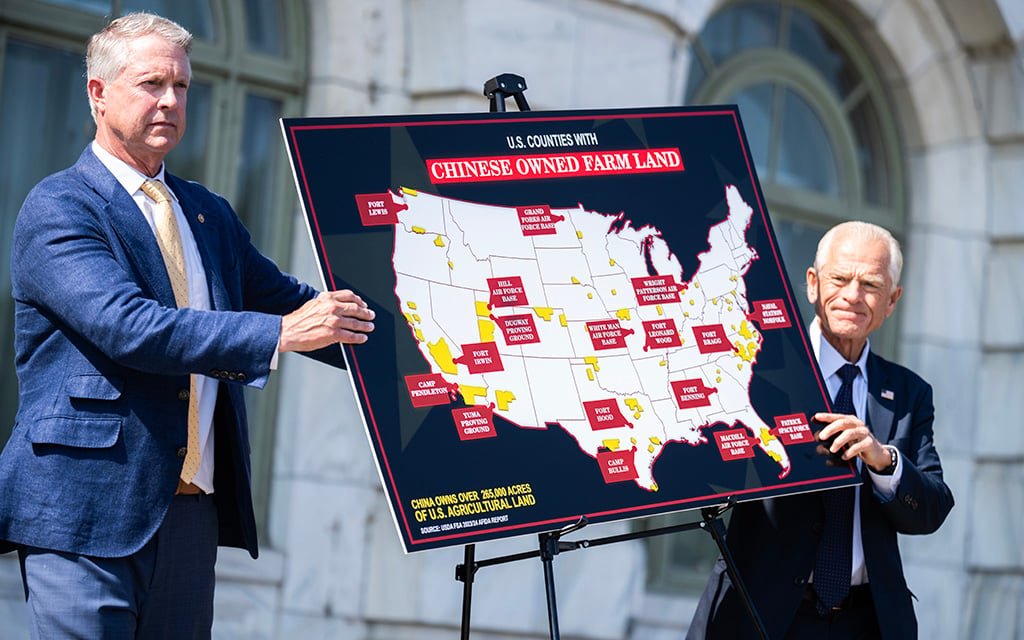Concerns Over Chinese-Owned Farmland in the U.S.
WASHINGTON – Recently, the Trump administration raised alarms about China acquiring farmland near U.S. military bases, announcing restrictions on ownership or control by Chinese investors.
During a press conference, officials from various departments displayed maps indicating that all of Maricopa County was marked red, with highlights on areas around Yuma Proving Ground.
Despite the dramatic visuals, the latest federal data reveals only one parcel in Arizona owned by China—a 322-acre plot in Chandler, located about 110 miles from the reported military grounds.
The presentation oversimplified the situation by coloring a large portion of the county, which spans over 9,200 square miles, and relied on outdated information suggesting nearly 10,000 acres were in Chinese hands.
This kind of map had previously appeared in the conservative New York Post. The USDA had also updated the land ownership lists last September.
Most of the land mentioned is associated with Walton International Group, a property management company based in Scottsdale. Yet, only the Chandler parcel is linked directly to Chinese ownership. Previous reports led to confusion regarding Walton’s holdings, prompting the company to work with the USDA to clarify ownership.
Interestingly, the USDA now identifies most of the land in question as owned by parties from Canada, Germany, Singapore, and Malaysia—all U.S. allies. Much of this land is earmarked for residential development, such as a 290-acre project in Buckeye.
In Pinal County, a 315-acre site owned by a Singaporean entity is set to become a solar farm, managed by a subsidiary of a French energy company, with operations expected to begin in 2028.
Yet, the only Chinese-related parcel in Arizona, purchased in 1983, is not associated with Walton. Records from Maricopa County show the land includes a condo worth about $400,000 and a nearly $1 million single-family home.
Overall, data reveals that Chinese investors own 277,336 acres of U.S. farmland, a figure that represents less than 1% of all foreign-held farmland.
Still, there are significant worries about foreign ownership. In 2024, for instance, President Biden ordered the sale of land near Warren Air Force Base in Wyoming, previously controlled by a Chinese-owned cryptocurrency company.
Defense Secretary Pete Hegseth emphasized the risks of foreign ownership adjacent to military sites during a recent briefing.
In response, Arizona lawmakers are taking measures to limit foreign land acquisition, particularly around military bases. A bill aimed at restricting foreign ownership was initially rejected by Governor Katie Hobbs for being overly broad but was signed later when a more targeted version was proposed.
The enacted law specifically prevents ownership by foreign governments classified as threats to national security by U.S. intelligence, which includes China, Iran, North Korea, and Russia.
Interestingly, USDA data suggests Arizona has no Iranian-owned farmland, while Russia has a mere 11 acres in Virginia, and North Korea has no holdings at all in the U.S.
As Governor Hobbs remarked upon signing this legislation, it aims to safeguard military and critical infrastructure amid increasing foreign threats.
Currently, 26 states have implemented restrictions on foreign ownership of farmland, although there is no overarching federal law prohibiting such practices, only executive actions initiated by the previous administration.
Secretary Rollins expressed intentions to reverse land ownership trends from the Trump era and speed up efforts to prevent foreign enemies from acquiring U.S. farmland.
Separately, Attorney General Pam Bondi noted recent arrests related to suspected biological weapons research by Chinese nationals, further fueling concerns about foreign influences.
Meanwhile, China’s Foreign Ministry criticized the U.S. actions as discriminatory, claiming they violate international trade norms.
A report from the Government Accountability Office had previously pointed to flaws in the USDA’s data collection, including double-counted land linked to China.







